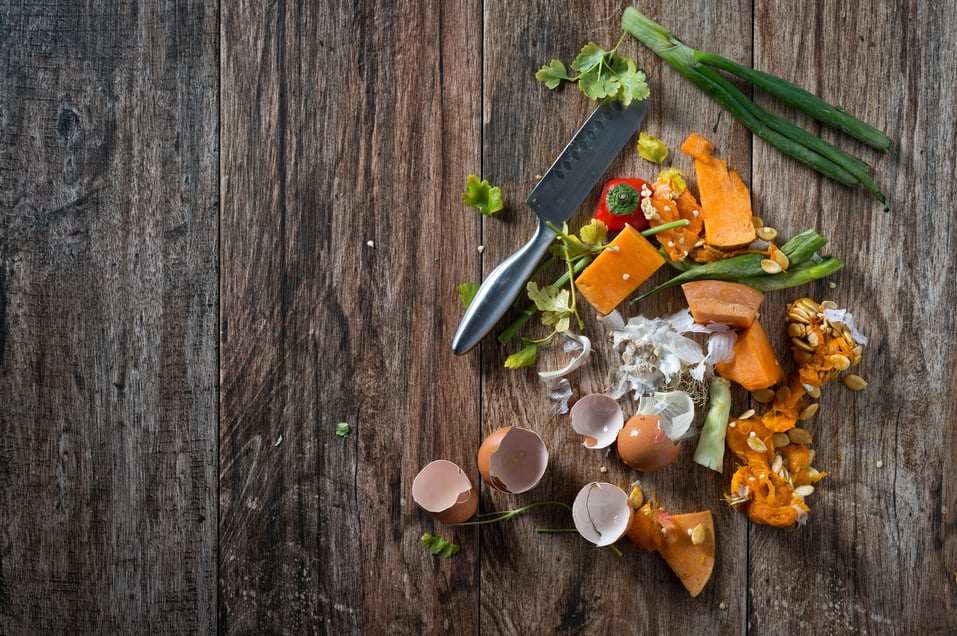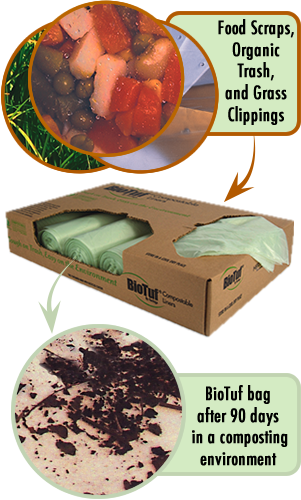According to a 2014 study by the Food Waste Reduction Alliance, food waste is a significant problem in American restaurants. Out of all the food waste generated, only 14.3% is recycled and 1.4% is donated, leaving 84.3% of unused food to be deposited into landfills or incinerated. The amount of food waste isn’t insignificant by any means; the Green Restaurant Association estimates that a single restaurant can generate 25,000 to 75,000 pounds of unused food in a single year.
By changing your excess food disposal process, your restaurant can become a more environmentally-responsible choice. Composting food waste ensures that it biologically decomposes into a nutrient-rich material. This process transforms food waste into an organic material that can be used as a mulch or compost to soil composition and aid in plant growth.
Composting is simple and possible all year long. Even though nearly two-thirds of the trash generated in the United States could be composted, nearly three-fourths of this trash is instead sent to landfills or incinerated. Food waste is a severe problem in America, and restaurants – some of the biggest generators of food waste – can take steps to eliminate the haphazard disposal of unused organic waste.
Restaurants composting food waste
In 2014, composting programs helped the United States recover 23 million tons of what otherwise would have become Municipal Solid Waste (MSW) destined for landfills or other non-renewable collection centers. In 2013, Americans generated 254 million tons of MSW, however, so the country still has a long way to go to reach sustainability. Still, composting programs are already commonplace at restaurants throughout the country. In fact, cities like San Francisco and Seattle require restaurants to separate their compost from their trash in order for these cities to better manage trash output. Restaurants in these cities and others now train their staff to separate organic material from other refuse and compost this type of compostable materials in dedicated bins.

Best practices for composting food waste
Ideologically, restaurants cannot ignore the green impact composting can have. Farm-to-table restaurants should think about the next step in the order of events through which their food travels: farm to table, and, after composting, back to the farm. In practical terms, implementing a composting program in your restaurant is easier than you think. Here are a few best practices for beginning a composting program at your restaurant:
Decide if you want to use a haul-away service or compost on your own
Many cities have haul-away services that will pick up and compost the waste your restaurant generates. You can find a list of local composting companies here. To decide if you want to use a service, call the company to see what their pick-up and composting procedures are. Make sure that they will compost all the organic waste your restaurant generates.
If you decide not to use a service, consider where you’ll set up your compost bin or bins. Remember, this process is much more challenging, and especially for restaurants in cities, finding enough room to establish your own composting station may be difficult.
Choose your tools
To start composting, you’ll need to choose the proper tools. First, create a collection bin; an old trashcan fitted with a ventilated lid is a smart choice. Next, choose the location in your restaurant where you want to store your compost pile for pickup. Finally, choose a rake or shovel that you can use to sift the compost pile for proper breakdown of the organic materials.
Create the right conditions
Organic materials become compost most effectively under certain conditions, another reason a composting service may be the right choice for your restaurant. Commercial composting operations generally keep their compost at a temperature of between 105° and 145°F, regulate airflow to give microorganisms enough oxygen to survive, and balance the compost heap with a mixture of carbon and oxygen. To complete the last step, try mixing your food waste with yard trimmings to maintain optimum balance.
Year-round composting practices
Depending on where you live in the country and the time of year, the organic matter-to-compost process will be generated differently. In the spring, organic matter may turn into compost within three weeks, but in the winter, your composting process will stop entirely if you keep your compost pile outside. However, no season means that you need to stop composting entirely. Instead, keep adding to your compost pile during colder seasons, and when spring rolls around, all the organic waste you have collected will turn into compost. Plus, if you choose a compost pick-up service, you can keep collecting compost for haul-away year-round, even in cold places.

Conclusions
Of course, lessening the amount of food waste your restaurant generates in the first place is the first step to creating a more eco-conscious business. Implement a food log system, evaluate your inventory, and offer innovative solutions – like employee meals and donation programs – to create less waste. Additionally, you can further commit to eco-friendly practices by stocking your establishment with biodegradable dishware and cutlery.
Further, if you’re not ready or able to commit to a composting program, you can still lessen your environmental impact by implementing alternative composting programs at your business. Dispose of your food waste in a BioTuf Compostable Bag, a product recommended by the American Society for Testing and Materials (ASTM) and the Biodegradable Products Institute (BPI). Unlike other types of bags, BioTuf bags are degradable in landfills, so they reduce waste and provide a simplified way to improve your restaurant’s environmentally-conscious reputation.
.jpg?width=192&name=BLT_Only_Logo_Black%20(19).jpg)



